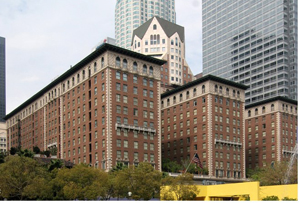
Biltmore Hotel
By Jim Robinson
The debate on Los Angeles’ new historic preservation ordinance has been taking so long that, by the time a decision is made, the ordinance itself may qualify as historic. In June, the city's Planning Commission again postponed its vote on amendments that would protect L.A.'s historic-cultural monuments from demolition. The next meeting has been set for September.
The new protection is part of a package of proposed changes to the city’s Cultural Heritage Ordinance, the first significant overhaul of that legislation since it was passed by the City Council in 1982. Other changes would clarify criteria for historic designation and provide earlier notification to property owners. (For the complete ordinance, go to www.preservation.lacity.org.)
The ordinance changes were recommended for approval by the city’s Cultural Heritage Commission in November, and had been scheduled to go to the Planning Commission March 12. But some property owners called for more time, and the deadline was extended to allow two more public workshops in April.
At a meeting for single-family home owners, held April 22 in the restored Dr. Grandville MacGowan Home, a West Adams monument, President Jim Robinson spoke on WAHA’s behalf in support of the changes. He also echoed a concern raised by Laura Meyers, a member of WAHA’s Historic Preservation Committee, that the revised ordinance should not exempt city-owned properties from the ordinance’s protections.
Several other WAHA members attended the meeting, including Vice President John Patterson, Anna Marie Brooks, Jim Weber and David Raposa, who assured a member of the audience that her home’s historic status would not harm her ability to obtain financing.
Owners of commercial, industrial and multi-family buildings attended a separate meeting two days later at City Hall, another city monument. Ironically, under the current ordinance, monuments such as the two meeting sites are protected only by a six-month stay of demolition and a possible six-month extension by the City Council, whereas requests to demolish more ordinary buildings in HPOZs may be permanently denied.
At earlier meetings, some owners had expressed concern over references in the revised ordinance to penalties for failure to maintain properties. At the MacGown Home meeting, Manager Ken Bernstein of the city’s Office of Historic Resources said the references were to existing code requirements for upkeep of all buildings in the city, whether or not they are historic. He said the proposed preservation ordinance would be further revised to simply refer to the upkeep requirements, rather than detailing them.
According to the Office of Historic Resources’ web site, the new ordinance will significantly improve the review process for owners of Monument properties, in the following ways:
● Well over 90 percent of requests for alteration of monument properties will continue to be signed off administratively under the new ordinance, just as they are today -- usually on the same day, "over-the-counter" or electronically.
● The new ordinance will create greater clarity for owners and make clear that certain work, such as ordinary maintenance and repair, is exempt from review altogether.
● The historic preservation standards on which approval is based will not be changing. These standards, used in every local government's preservation law, are meant to allow significant change to historic properties, not to "freeze" historic buildings in time.
● Demolition of historic-cultural monuments may still be approved, and may be approved even if no economic hardship exists.
● The new ordinance will, for the first time, ensure that property owners have the right to participate in all public hearings on the potential designation of a property as a monument.
● The ordinance will create a more "up front" system of preservation review, rather than continuing to surprise owners with review of proposed work only at the "back end," at a project's permit phase.
● Property owners will also, for the first time, have a right of appeal to the City Council if they disagree with the interpretation of staff and the Cultural Heritage Commission.
If approved by the Planning Commission, the ordinance changes will go to the City Council for final approval.
